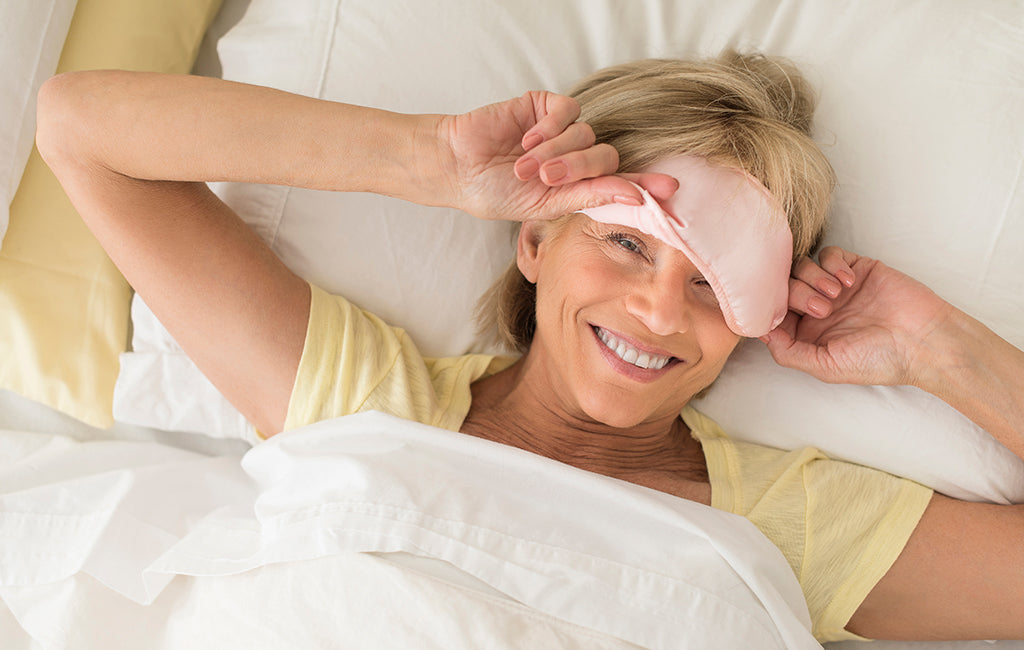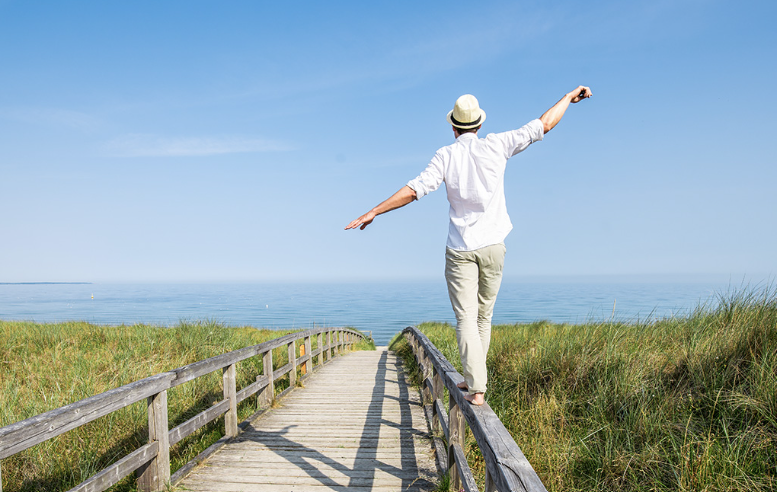
When looking to get a better and more restful night’s sleep, developing healthy sleeping habits can make a world of difference.
Good sleep habits — sometimes referred to as sleep hygiene — often consist of setting a consistent bedtime and limiting the number of naps you take during the day, but healthy sleep habits also about reducing the amount of stress you experience throughout the day and night.
Our brains find comfort in the familiar, and the more we do a thing, the easier it is for our brains to complete it more quickly and efficiently.
In which case, we’ve compiled a list of tips for better sleep which also includes CBD oil that’ll help you wake up refreshed, relaxed and ready to take on the day.
Create a Routine
One of the sleep tips you should do is to create a routine. If you’re wondering how to get better sleep, consistency is the foundation of a restful night. Your body loves routine — and your mind does too. Essentially, we’re wired for habit.
Our brains find comfort in the familiar, and the more we do a thing, the easier it is for our brains to complete it more quickly andefficiently.
It’s the same with sleep and bedtime routines.
When creating a bedtime routine, the goal is to establish an environment that promotes relaxation so that our bodies can maintain a comfortable sleep by:
- Avoiding naps near bedtime
- Going to bed at the same time each night
- Ensuring you’re getting 7 to 8 hours of sleep each night
- Consistently performing a relaxing activity, such as doing a calming yoga routine, taking a warm bath, or drinking a cup of tea to tell your brain it’s time to sleep
Essentially, it’s important to make your bedtime routine your own. You know your body best and what works for you.
To establish a bedtime routine that meets your needs, identify the factors that have been the most disruptive to your sleep.
Are you constantly checking your bedside clock, anguishing at the late hour? Do you find yourself turning on the T.V. when you’re unable to get some shut-eye?
Once you’ve identified your bad habits, eliminate and replace them with something new. If you find yourself checking your clock, consider moving it to a place where you can’t easily see the digits from your bed. Then, replace your negative self-talk — “I’ll never get enough sleep for tomorrow’s big meeting” — with positive thinking.
Negative thinking actually produced more stress, making it more difficult to fall asleep. By increasing your positive outlook on your night to come, you can actually reduce your stress and improve your quality of sleep.
Remove Electronics
Electronics are everywhere — screening devices, reading gadgets and those pesky smartphones — each beckoning you to scroll more, screen more and sleep less.
While you may feel like scrolling through Instagram or reading a digital book winds you down for the day, it’s actually quite the opposite. Electronics emit something called blue light — a highly visible type of light that can actually disrupt your sleep patterns. Blue light is emitted by:
- Fluorescent and LED lights
- Smartphones
- Televisions
- Computer screens
- Tablets and e-readers
- Handheld video game consoles
During the day, blue light can actually be beneficial to your productivity and alertness because it suppresses the amount of melatonin released by your body. Melatonin is a hormone that regulates your sleep schedule and makes you feel tired. It works hand in hand with light: Your body produces higher levels of melatonin during low levels of light and lower levels when the sun’s higher in the sky. As such, suppression of melatonin can be detrimental to your restful sleep.
In order to reduce blue light exposure, consider:
- Switching the light source in your bedroom
- Implementing a sleeping mask to block out harmful light
- Applying blue light filters to your screens
- Wearing blue light protection glasses when using your computer or phone after dark
- Turning all screens off 15 to 30 minutes before bedtime
- Following the 20-20-20 rule — when looking at a digital screen, take a 20-second break every 20 minutes to look at something 20 feet away
Limit Your Daytime Coffee Breaks
We’ve all been there — it’s 2 p.m. and you’re feeling absolutely sluggish. Most of us will gravitate toward the coffee machine, but if you’re looking to improve your sleep, avoid the bean juice, as drinking coffee during the day may keep you awake at night.
In essence, coffee is a stimulant, and sometimes that’s exactly what we need. While it’s not recommended to drink coffee immediately after waking up, a cup of coffee an hour or two after you rise can be the perfect mid-morning boost (early morning coffee can affect your body’s cortisol production, which, ironically, is the hormone that helps us feel awake and alert).
Additionally, drinking coffee can delay your circadian rhythm, the body’s internal clock that regulates your sleep-wake cycle. As such, caffeine intake can reduce the number of hours your body is able to sleep.
To avoid a caffeine-induced all-nighter, follow the following caffeine recommendations:
- Limit your caffeine intake to no more than 400 mg a day — that’s about four cups.
- Avoid drinking coffee during the late afternoon and evening hours.
- Eliminate other caffeinated treats, such as chocolate, soda, energy drinks and both black and green teas after lunch.
After consuming a steaming cup of joe, the caffeine can stay in your body for up to 12 hours. As such, if you drink a cup of coffee at 2 p.m., you may be wide-eyed until 2 a.m.
Moderate exercise, such as jogging or dancing, can help you feel energized and alert during the day and tired at night.
If you’re struggling with getting a good night’s sleep and wonder if caffeine is to blame, check to see if you’re experiencing high levels of stress, headaches and restlessness throughout the day. If you are, caffeine might be at play.
Exercise Regularly
Physical activity contributes to your holistic health. In other words, exercising not only improves your cardiovascular and muscular health but can also improve your sleep.
According to a study by Oregon State University, participants who exercise moderately to vigorously exercise at least 150 minutes a week found improvement in their quality of sleep. Exercise and proper stretching like yoga are also one of the ways on how to sleep with neck pain and how to sleep with lower back pain. In fact, doing this might even avoid aches and pains altogether.
Moderate exercise, such as jogging or dancing, can help you feel energized and alert during the day and tired at night. Even light exercise can contribute to good sleep hygiene. When winding down after a long day, consider:
- A relaxing yoga routine
- A 30-minute walk around the neighborhood
- A light swim in your pool
Avoid any intense workouts before bed, such as interval training, running, or cycling.
Make Your Bedroom Cozy
Many people who experience high levels of unease and stress throughout their days can benefit from decluttering and renovating their space to create a calming environment that’s conducive to deep sleep.
When creating your optimal sleeping environment, consider the following:
- Temperature – Most people get good quality sleep in a cool room. Set your thermostat to anywhere between 60 and 67 degrees Fahrenheit for an optimal sleeping temperature.
- Bedding – Invest in a mattress that supports your sleeping habits. Many mattresses are made to support certain sleeping positions. For example, if you’re a side-sleeper, you’ll want to find a mattress that provides the right amount of ergonomic support for your hips and shoulders. You’ll also want to dress your bed in breathable fabrics to avoid overheating during the night.
- Lighting – As stated, blue light can be detrimental to a good night’s sleep. But other light sources, such as the street light outside your window, can also affect your ability to fall asleep. Consider black-out window coverings or a sleeping mask to promote melatonin production and fall asleep quicker.
- Noise reduction – If you live near a busy street, a railroad track, or a loud bar, you may suffer from sleep disturbances. Nightly noise pollution can greatly reduce your quality of sleep, making you more tired in the morning. As such, consider earplugs or a white noise machine to reduce unwanted noise and sleep soundly.
- Calming scents – Scents, such as lavender and eucalyptus, can have a calming effect. Consider investing in an essential oil diffuser to fill your bedroom with relaxing perfumes as you drift to sleep.
Manage Your Stress and Sleep Better With CBD
Stress is a huge contributor to a bad night’s sleep. As such, CBD can be a great answer to how to sleep better at night.
CBD is a compound derived from the hemp plant, which is a cousin of the marijuana plant — although it does not have the psychoactive effects that weed has. CBD can be orally ingested or topically absorbed through your skin’s pores to help support your overall health and wellness.
In addition, CBD is known to interact with the body’s endocannabinoid system (ECS), which works to maintain homeostasis and regulate your body’s systems, including the nervous system, which controls sleep. As such, a CBD oil, tablet, or gummy may improve your sleep if ingested before bedtime.
How to Sleep Better With Zebra CBD
When embarking on a new nighttime routine to improve your sleep, you’ll want to supplement your journey with a conscious approach to electronics use, caffeine consumption and stress management.
For that, Zebra CBD can help.
Our CBD products are made with premium hemp extract and tested by two third-party labs to ensure top-quality ingredients that help our customers sleep better.
In addition to our CBD oils and CBD edibles, we also have a lineup of CBD chewable tablets including our Sleep Support tablets made with Valerian root, as well as CBD oil roll-on. These products naturally support a night of healthy sleep, with the calming scent of CBD oil roll-on enhancing your overall sleep experience.
With Zebra CBD on your bedside table, you’ll be catching Z’s instead of counting sheep.
Source:
Centers for Disease Control and Prevention. Tips for Better Sleep. https://www.cdc.gov/sleep/about_sleep/sleep_hygiene.html
Healthline. Sleep Hygiene Explained and 10 Tips for Better Sleep. https://www.healthline.com/health/sleep-hygiene#limit-activities
Get Sleep. Adopt Good Sleep Habits. https://healthysleep.med.harvard.edu/need-sleep/what-can-you-do/good-sleep-habits
Oregon State University. Study: Physical Activity Impacts Overall Quality of Sleep. https://today.oregonstate.edu/archives/2011/nov/study-physical-activity-impacts-overall-quality-sleep
Sleep Foundation. Caffeine and Sleep. https://www.sleepfoundation.org/nutrition/caffeine-and-sleep
Sleep Education. Sleep and Caffeine. https://sleepeducation.org/sleep-caffeine/
Business Insider. Here’s the Best Times of the Day to Drink Coffee. https://www.businessinsider.com/heres-the-best-times-of-the-day-to-drink-coffee-2017-8
UC Davis Health. Is Blue Light from Your Cell Phone, TV Bad for Your Health? https://health.ucdavis.edu/health-news/newsroom/is-blue-light-from-your-cell-phone-tv-bad-for-your-health/2019/05
Sleep Foundation. How Blue Light Affects Sleep. https://www.sleepfoundation.org/bedroom-environment/blue-light
Sleep Education. Breaking the Cycles of Stress, Negative Thoughts, and Sleeplessness. https://sleepeducation.org/breaking-cycle-stress-negative-thoughts-sleeplessness/










